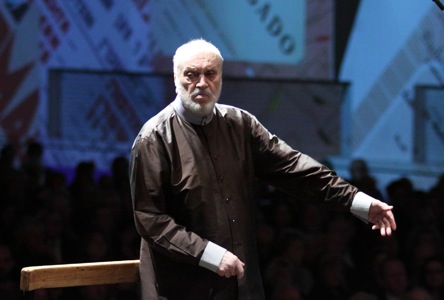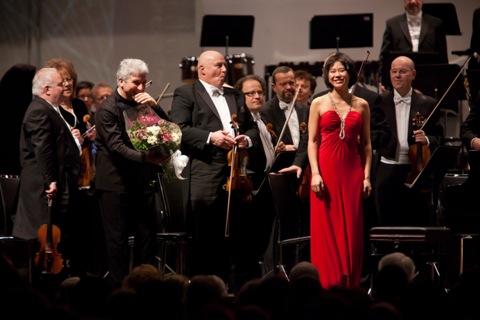Going from strength to strength
In honor of its 75th anniversary, the Israel Philharmonic Orchestra (IPO) recently put on a two-week music extravaganza with participation of some of the greatest artists in the world. Conductors who made an appearance included Zubin Mehta Valery Gergiev, Christoph Dohnanyi, Gianandrea Noseda and Kurt Masur. Amongst the prominent soloists were Evgeny Kissin, Murray Perahia, Daniil Trifonov, Pinchas Zukerman, Vadim Repin, Gil Shaham and Julian Rachlin.
The IPO's home base in Tel Aviv, the Frederic R. Mann Auditorium, is currently undergoing refurbishment so the concerts took place in a converted hanger in Tel Aviv's port. This large cavernous space was not very conducive to music making. It was difficult to see orchestra and soloists although the management did project the happenings on stage onto giant screens, which did to some extent add an element of intimacy.
There was a splendid recital by Evgeny Kissin, who is today at the very forefront of the world's great pianists. The first half of the recital was marred by the incessant humming from the air-conditioning units which was only rectified after intermission. It was a great pity that this recital did not take place in a more appropriate intimate venue.
Despite these drawbacks, Kissin held the audience spellbound by his magnificent playing. In his rendering of Beethoven's Moonlight sonata, his performance was divorced from sentimentality and he gave a deeply introspective account of this ever-popular work and finished off with a whirlwind account of the final presto movement.
This was followed by a performance of Samuel Barber's neo-romantic sonata for piano op 26, which was premiered in 1950 by another Russian, Vladimir Horowitz. Kissin gave a superb account of this fiendishly difficult work. Although tonal in structure, with Kissin at the keyboard, it became readily evident that Barber incorporated some elements of the Viennese atonal school into this work. Especially noteworthy was the very demanding concluding fourth movement, a fugue, which is often performed by itself as a stand-alone composition.
The rest of the concert was devoted to Chopin. Kissin did not over indulge the romantic aspect of this composer's music and his rendering of the Nocturne Opus 32 no.2 was well thought out and beautifully structured. He then gave a magisterial account of Chopin's third piano sonata, the composer's last major work. Particularly arresting was the slow largo trancelike third movement and he brought out all the power of the final movement ending with the dramatic crescendos. This was a fitting climax to a great concert.
The final concert of the festival was devoted to a performance of Beethoven's first and ninth symphonies. Ken-David Mazur, the son of Kurt Mazur, was at the podium for the first symphony. He coaxed lush flowing string playing from the IPO and there were some lovely woodwind passages in the first movement. All told, this was a solid respectable performance.
Honorary Guest Conductor of the IPO, Kurt Mazur, took over for the ninth symphony. As is his usual practice, he conducted without a baton. He looked somewhat frail and with his minimum arm gestures, it must have been difficult for the orchestra to follow him. Most of their cues came from his facial motions and eye movements. Nevertheless, the orchestra responded magnificently.
 Mazur took the first movement at a rather slow, but measured pace. In the third movement, woodwinds, brass and strings combined to give a sublime account of this adagio, arguably the greatest orchestral music that Beethoven ever composed.
Mazur took the first movement at a rather slow, but measured pace. In the third movement, woodwinds, brass and strings combined to give a sublime account of this adagio, arguably the greatest orchestral music that Beethoven ever composed.
The vocal forces made their appearance in the final movement, which contains the famous Ode to Joy by Friedrich Schiller. Beethoven was never kind to his singers and the acoustically hostile environment compounded their problems. Of the soloists, the most satisfying was Ruth Ziesak, whose soaring soprano could be clearly heard above the orchestra and choir. Veteran bass Kurt Rydl did not have a good night. The real heroes were the magnificent Gary Bertini Israeli Choir and the Jerusalem Academy Chamber Choir. All told, this concert was a fitting climax to a remarkable anniversary celebration.
After this festival, it was back to business as usual with the regular subscription series. In Jerusalem, the 24-year-old Chinese virtuoso pianist, Yuja Wang, selected Rachmaninov's Third Piano Concerto, the so-called Rach 3 for her debut. Because of its technical and musical demands, this is regarded as one of the most difficult in the piano repertoire.
Yuja Wang gave an unforgettable masterful and mature performance, which completely belied her age. She brought a light touch to this work, displaying all the required virtuosity without too much showmanship. Everything flowed seamlessly from her fingers. She captured the Russian romanticism of the work whilst dispatching the many virtuosic passages with gusto and aplomb. Indeed she electrified the audience with a most memorable account of this piano concerto.
 Peter Oundjian led the IPO in this concert. He was at one time, first violin of the notable Tokyo Quartet but has now branched into conducting and is currently Music Director to the Toronto Symphony Orchestra. He provided sympathetic accompaniment, although at times, orchestral participation seemed too passive and maybe a little more fire would not have been out of place.
Peter Oundjian led the IPO in this concert. He was at one time, first violin of the notable Tokyo Quartet but has now branched into conducting and is currently Music Director to the Toronto Symphony Orchestra. He provided sympathetic accompaniment, although at times, orchestral participation seemed too passive and maybe a little more fire would not have been out of place.
After intermission there was a performance of Rachmaninov's Symphonic Dances, the composer's last orchestral work. After Yuja Wang's tour de force, this was a hard act to follow. Nevertheless, Oundjian and the orchestra certainly conveyed the romantic sweep of the work. Particularly effective was the eerie and sinister waltz motive in the second movement and the Dies Irae which is part of the Roman Catholic Requiem Mass of the final movement. This was a lively performance but I would have preferred Oundjian to drive the powerful forces of the IPO to an even greater extent in the forte passages. This would have added significantly more dramatic contrasts.
Legend to Figures:
Fig 1: Veteran Conductor, Kurt Mazur (credit Dan Porges ©)
Fig 2: Yuja Wang, acknowledging applause after her concert with the Israel Philharmonic Orchestra (credit Shai Skiff)
 Mazur took the first movement at a rather slow, but measured pace. In the third movement, woodwinds, brass and strings combined to give a sublime account of this adagio, arguably the greatest orchestral music that Beethoven ever composed.
Mazur took the first movement at a rather slow, but measured pace. In the third movement, woodwinds, brass and strings combined to give a sublime account of this adagio, arguably the greatest orchestral music that Beethoven ever composed. Peter Oundjian led the IPO in this concert. He was at one time, first violin of the notable Tokyo Quartet but has now branched into conducting and is currently Music Director to the Toronto Symphony Orchestra. He provided sympathetic accompaniment, although at times, orchestral participation seemed too passive and maybe a little more fire would not have been out of place.
Peter Oundjian led the IPO in this concert. He was at one time, first violin of the notable Tokyo Quartet but has now branched into conducting and is currently Music Director to the Toronto Symphony Orchestra. He provided sympathetic accompaniment, although at times, orchestral participation seemed too passive and maybe a little more fire would not have been out of place. 
Leave a comment